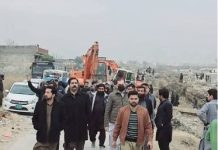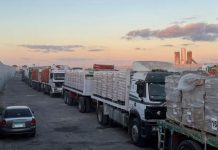DNA
ISLAMABAD, DEC 15 – The Governor State Bank Reza Baqar has said that the exports have recovered to their pre-COVID monthly level of around $2 billion, with the strongest recovery in textiles, rice, cement, chemicals, and pharmaceuticals. Pakistan needs to focus on competitiveness and reduce imports even further to support local businesses.
Addressing the plenary on “Pakistan’s Economic Response to COVID-19 and Way Forward for an Inclusive Economic Recovery” on the second day of the 23rd Annual Sustainable Development Conference of the Sustainable Development Policy Institute (SDPI) here Tuesday, the Governor State Bank said to boost economic activity and job opportunities in the country, the State Bank of Pakistan is working with the banks to see that lending to Small and Medium Enterprises (SMEs) and housing financing facilities are increased in collaboration with banks. He said that under the Prime Minister’s instruction, the government has coordinated a consistent and holistic policy to promote housing and construction sector. At the Central Bank’s end, we are working with the banks to help them support this sector, he added.
The Governor of the central bank said: “India’s economy has suffered sharp decline. Pakistan has not been hard hit because the country controlled COVID-19 well and the government and SBP took timely measures to stop bankruptcies from happening since that can lead to major and long-term implications. Now that demand is coming back from world market, our exporters were ready due to the liquidity and smart lockdowns. What we need to focus on now is to increase our export-to-GDP ratio.”
Dr Reza Baqir said under the TERF scheme, SBP would refinance banks to provide financing at a maximum end-user rate of 7% for 10 years for the purpose of new imported and locally manufactured plants and machinery for setting up new projects and expansion for existing projects/businesses.
As a country, we should be proud that the world is recognizing and acknowledging our success in tackling the COVID-19 pandemic. At the State Bank of Pakistan, we are cautiously optimistic and seeing early signs of a promising recovery. We should not be hostage to our past. As the 5th largest country in the world, we cannot let our expectations for the future be limited by the problems of our past. We have to embrace the future as a people that do not have any inherent constraints on their abilities to achieve economic prosperity. So, we have to overcome the baggage of the past and grow optimistic. If we succeed in becoming more forward looking and look at our true potential, we can have great prosperity that will embrace us, he added.
Dr Baqar said: “The IMF, like the government, wants power sector reforms and reduction of circular debt; second that tax collection should be automated and cases of abuse reduced so that people are facilitated in dealing with tax authorities, plus to increase the tax net. Both the IMF and the government want the same thing in this regard.”
Earlier speaking at a session on “Impact of COVID-19 on Food Security: Challenges for Women”, Ms Androulla Kaminara, European Union ambassador to Pakistan, said that food is not insufficient in Pakistan, but it is inaccessible for the poor and vulnerable classes and communities. The EU ambassador also explained as to how COVID-19, poverty, gendered policies, and many other factors are adding to the food insecurity and injustice towards women.
Rashid Mehmood, Additional Secretary for Ministry of National Food Security and Research said that Pakistan needs to promote multi-sectoral approach to address food insecurity in the country.
Mr Wouter Plomp, the Ambassador of Netherlands in Islamabad, stressed the need to keep food markets operational so that the food security can be improved and ensured.
Dr Aamer Irshad from Food and Agriculture Organization, termed the pandemic a global situation and explained that how the economy and production is reducing due to COVID-19. He highlighted that the bad weather, cost of production and imports are causing food inflation
Dr Pauline Oosterhoff, Institute of Development Studies, discussed as to how the COVID-19 has increased the invisible burden for women as well as their unpaid responsibility. She said food is really necessary for every kind of development.
Speaking at a session on Future of BRI in the Post-COVID World, Lt-Gen. Asim Saleem Bajwa said small developing countries cannot afford packages what the developed countries have allocated for their people to handle the pandemic. In these dire circumstances, BRI is a beacon of hope and relief for the developing countries.
Xie Guoxian, the Chairman of ACEF, Beijing said that China has changed the traditional concept of development. From and unconventional point of view, he said, China emerged as a powerful economic power and is also cooperating positively while recognizing all the difficulties of Pakistan.
Xie Yuhong, Minister Counselor, Embassy of China in Islamabad, said that COVID-19 implies that all world should work together to overcome the challenges, including climate changes, etc. The goal of the omniverse is same for all countries and all people.
Mudassir Tipu, Ministry of Foreign Affairs, said that CPEC has finally successful in entering into its second phase. Both Pakistan and China want to complete CPEC as soon as possible, he said.
Speaking at a session on Government of Tomorrow: Re-imagining the Role of Government after COVID-19, SDPI Executive Director Dr Abid Qaiyum Suleri said that communication creates incentives for people through transparency of government policies and effectiveness of bureaucracy.
Dr Fahmida Khatun, Executive Director, Centre for Policy Dialogue, Bangladesh said the current situation emphasized upon the role of government on Green Economy rather than focusing on high growth numbers because growth numbers like GDP is not a scale to measure the people’s welfare.
Dr Dushni Weerakon, Executive Director, Institute of Policy Studies, Colombo said that COVID-19 has exposed real flaws in our system like limited rights to bureaucrats in implementing policy and lack of integrated disaster management institutions to be prepared for any upcoming disasters.
Speaking at a session on Accelerating SDGs Achievement and Building Back Better from COVID-19 Pandemic in South Asia, Dr Nagesh Kumar, Director, UNESCAP, stressed the need for national strategies to focus on building better rather than trying to re-establish the status quo preceding the pandemic. He also emphasized that regional cooperation could play an important role to national efforts.
Riaz Fatayana, Chairman Parliamentary Taskforce on SDGs respectively, talked about the social, economic, and political challenges Pakistan is faced with and continues to do so due to COVID19. It was also discussed that the problems are universal and as such the efforts to address them should be more holistic. Ms. Romina Khurshid, member of the Task force called upon a joint parliamentary response by South Asian parliaments on SDGs achievements.
Mr. Nazir Kabiri, Executive Director, Biruni Institute, Afghanistan, said Afghanistan is a fragile economy even before the pandemic and relied heavily on external financing.
Dr. Fahmida Khatun, Executive Director, CPD, Dhaka reiterated that some of the structural challenges of South Asian economies are the same.
Prof. Dr Sachin Chaturvedi, the Director-General, RIS, New Delhi said the local production capacity of necessary protective gear and equipment has seen an unprecedented rise.
Dr. Posh Raj Pandey, Executive Chairman, SAWTEE, Kathmandu, pointed out that the mixed progress on SDGs in Nepal is now either erased or will slow down due to reallocation of resources to COVID-19 impact.
Dr. Dushni Weerakoon, Executive Director, IPS, Sri Lanka said the financial & economic fallout of COVID-19 may further impact government programs and priorities as there will now be reducing funding for already cash trapped countries.
Speaking at a session on Getting SDGs Back on Track: Innovative Solutions of Post-Pandemic Recovery, Dr Khaqan Hassan Najeeb, Advisor to Ministry of Finance, stressed the need to address corruption in procurement; we need to update the PPRE rules and ensure performance audits to strengthen our response against the pandemic.
Dr Ather Osama, Advisor to Higher Education Commission of Pakistan, said that due to lack of technological innovation and awareness, public sector schools suffered the most during the pandemic. He added that HEC Pakistan launched two funding programmes during the pandemic for the higher education, which included the Grand Challenge Fund (GCF) and the Local Challenge Fund (LCF).
SDPI Joint Executive Director Dr Vaqar Ahmed suggested that although the G-20 Debt Relief supported the developing countries during the pandemic, there is a need to improve local resource funding to execute social development program schemes and for that we need to improve public private partnership.
Dr. Zubair Iqbal Ghauri, Pro Rector of National University of Modern Languages, said that though 15% increase in A grade has been observed because of poor evaluation system of digital learning, 12% decrease in grades of female students has also been reported during the pandemic lockdown.
Ali Salman from PRIME proposed that the think tanks and academia need to collaborate effectively and work through domestic resource mobilization. Think tanks need to focus more on problem solving rather than advocacy.
Syed Muhammad Mustafa, Advisor GIZ GmbH, Pakistan, said that the social assistance programmes launched by the government of Pakistan during COVID-19 have gained international recognition. He said that the role of digital technology such as biometric CNIC system has helped to improve the social assistance schemes in the country.
At another session titled: An Overwhelming Role of ICTs during COVID-19 Era and Beyond
Former Finance Minister Sartaz Aziz said that the ICT plays an important role in post-COVID plan to overcome bigger challenges. A national plan of digital transformation should be formulated with public-private partnership.
Dr Shaheen Sardar Ali, Rector of Higher Educational Academy, said complete transition to online education is a journey into the unknown for students, teachers, universities and the society at large. This requires policy role and capacity building of “doing by learning” and equal opportunities for all students and teachers across the country.
Mr. Parvez Iftikhar, Member of Prime Minister’s Task Force on ICTs, said that COVID-19 has shown that a high speed and large capacity Internet is a must to keep moving the wheels of economy, health, education and other sectors of life. Only the optic fiber infrastructure can meet the demand, which unfortunately, Pakistan is lacking at the moment.
Dr. Faisal Shaheen, Senior Lecturer in Politics and Public Administration, University of Ryerson, Canada said that Trust and Coordination are key things in lockdowns who have forced employees across all sectors to work from home to sustain operations and service deliveries resulting in overloading ICT networks and creating information security problems.
Dr Adeela Rehman, Assistant Professor, Fatima Jinnah University, Rawalpindi suggested blended learning which is a fusion of face to face and online experience. And interface of human technology, motivation and structures and control.
Brig. (retd) Mohammad Yasin from SDPI said in these difficult times, Information and Communication Technologies (ICTs) played a key role in keeping the people informed about the dangers and to adopt measures to fight the coronavirus.
At a session on Perspective on community resilience to violent extremism: challenges in the Time of COVID-19, Dr Sehrish Qayyum from Lahore presented the challenges to community resilience to violent extremism during the pandemic. She elaborated the genetic lineages versus disturbance in social environment, psychosocial reasons demarcating positive and negative results.
Dr Syed Hussain Shaheed Soherwordi from Peshawar University said that when the world follows SOPs to avert corona impact, the US, instead of taking it serious, is saying that it’s a Chinese virus and same attitude followed by the Indians and there is a high proportion of people who suffered from the pandemic.
Dr. Makki from National University of Science and Technology said that it’s for very first time observed how life changes. He said that we all have been shifted to e-chambers.
Dr Musferah from Lahore said that Muslim world is facing false accusations of violence, extremism with social economic and political marginalization due to misinterpretation and miscalculation of Islamic narratives.
Dr Farhan Zahid, CPO, Quetta, said that in Pakistan some different trends of terrorism were experienced; our government has taken different initiative to control it.
Speaking at a session on ‘Rural Communities in the Fight against COVID-19, experts said that rural communities are most prone to the pandemic, therefore, a robust awareness and preparedness campaign among these communities can help them save them from the pandemic.
Dr Pervez Tahir, Former Chief Economist, discussed as to how the rural community can be taken on board during emergency, which, otherwise, always has been be a challenge.
Dr Rashid Bajwa,. Nadir Gul Barech, Ms Shabana Iftikhar and Shandana Khan also spoke.

















